Translate this page into:
Quaesitio: An Online Peer-Based Research Training Program for Indian Medical Students
Corresponding author: Shirish Rao, Seth GS Medical College & KEM Hospital, Mumbai, India. Email: shirishrao.1608@gmail.com
-
Received: ,
Accepted: ,
Abstract
Indian medical students often lack adequate research training, impacting their ability to conduct high-quality research. To address this gap, we developed Quaesitio, a peer-based research training program. Quaesitio consisted of eight sessions covering research skills such as ideation, literature review, study design, protocol writing, ethics clearance, questionnaire designing, practical biostatistics, manuscript writing, and publication. Peer mentors, experienced students with a passion for teaching, were recruited. The program spanned a month and attracted 124 student participants. Sessions were conducted online, with two sessions per week. The emphasis was on practical aspects, active participation, and live demonstrations. Students learned how to refine research ideas, conduct literature searches, choose study designs, understand biostatistics, design questionnaires, write protocols, seek ethical clearance, and prepare manuscripts for publication. Post-program assessments showed a significant increase in knowledge and perceived skill scores among students. The positive correlation between skill scores and post-test knowledge scores indicated that improved knowledge contributed to enhanced perceived skills. Students provided highly positive feedback, highlighting the effectiveness of the peer-based approach, active learning, and practical demonstrations. Quaesitio exemplified the effectiveness of online peer-based research training programs in enhancing research skills and empowering medical students. By focusing on practical sessions and active learning, the program addressed the research skills gap. These initiatives have the potential to improve the quality of medical research conducted by Indian medical students.
Keywords
Undergraduate Research
Peer based Training
Online Medical Education
Programme Evaluation
INTRODUCTION
Research is an integral part of medical education. Unfortunately, Indian medical students are not adequately trained in research skills, which affects their ability to conduct high-quality research.1,2 Research training in medical schools is either limited or not included in the curriculum, which makes it difficult for medical students to conduct research.2 Peer-based teaching is an effective way to address this gap, where students learn from their peers who are more experienced in research.3,4 Inspired from this concept we developed a peer-based research training program called Quaesitio, to enhance the research skills of medical students.
PROGRAM DEVELOPMENT
Quaesitio was conceptualized as a research training activity under the medical student organization ‘Clinicase’. It was a month-long program consisting of 8 sessions, each focusing on a specific research skill like, Research Ideation, Literature Review, Study Designs, Protocol Writing, Ethics Clearance, Questionnaire Designing, Practical Biostatistics, Manuscript Writing and Publication. (Figure 1) After finalizing the session’s topics, the organizers reached out to potential peer mentors who had at least 1-2 years of experience in research. These peer mentors were third year to internship students who also had a specific interest in teaching a particular research topic to students. To invite participants, registration forms and posters were sent out on Instagram pages and WhatsApp groups. To enable maximum participation from across the country, the sessions were conducted online. (Figure 2A & B)
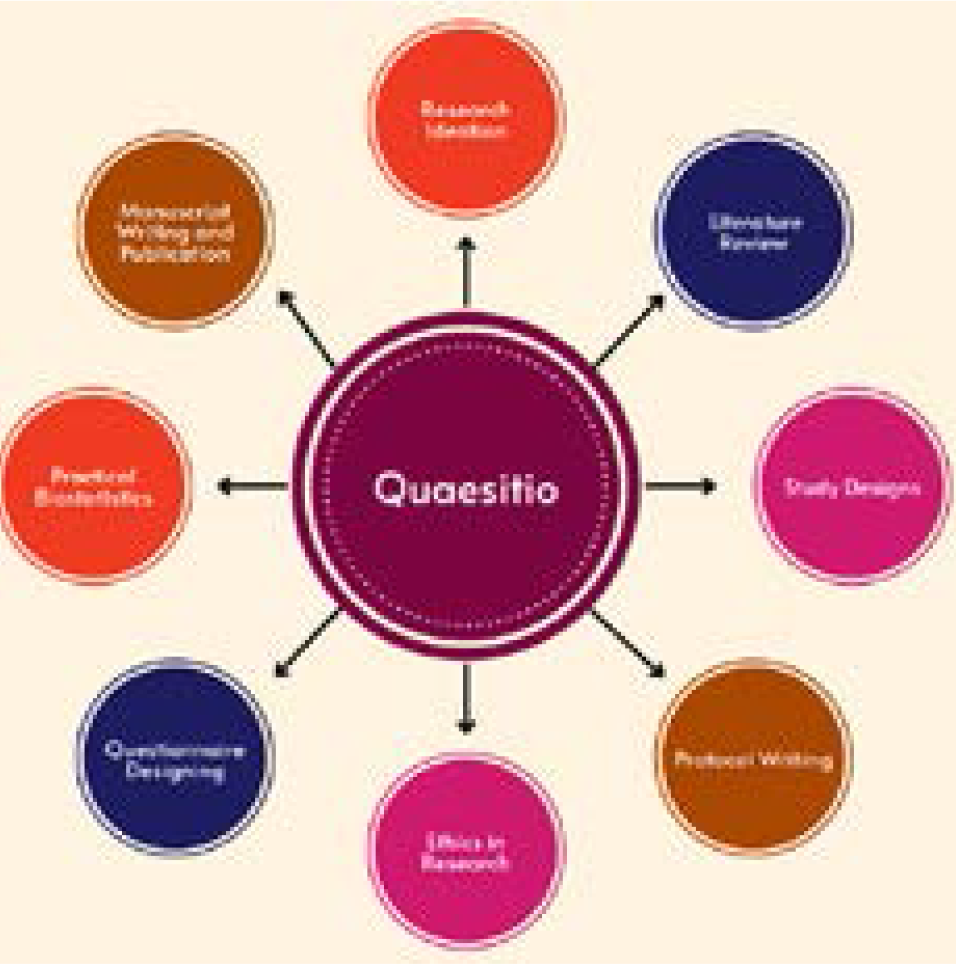
- Module wise Sessions conducted during Quaesitio
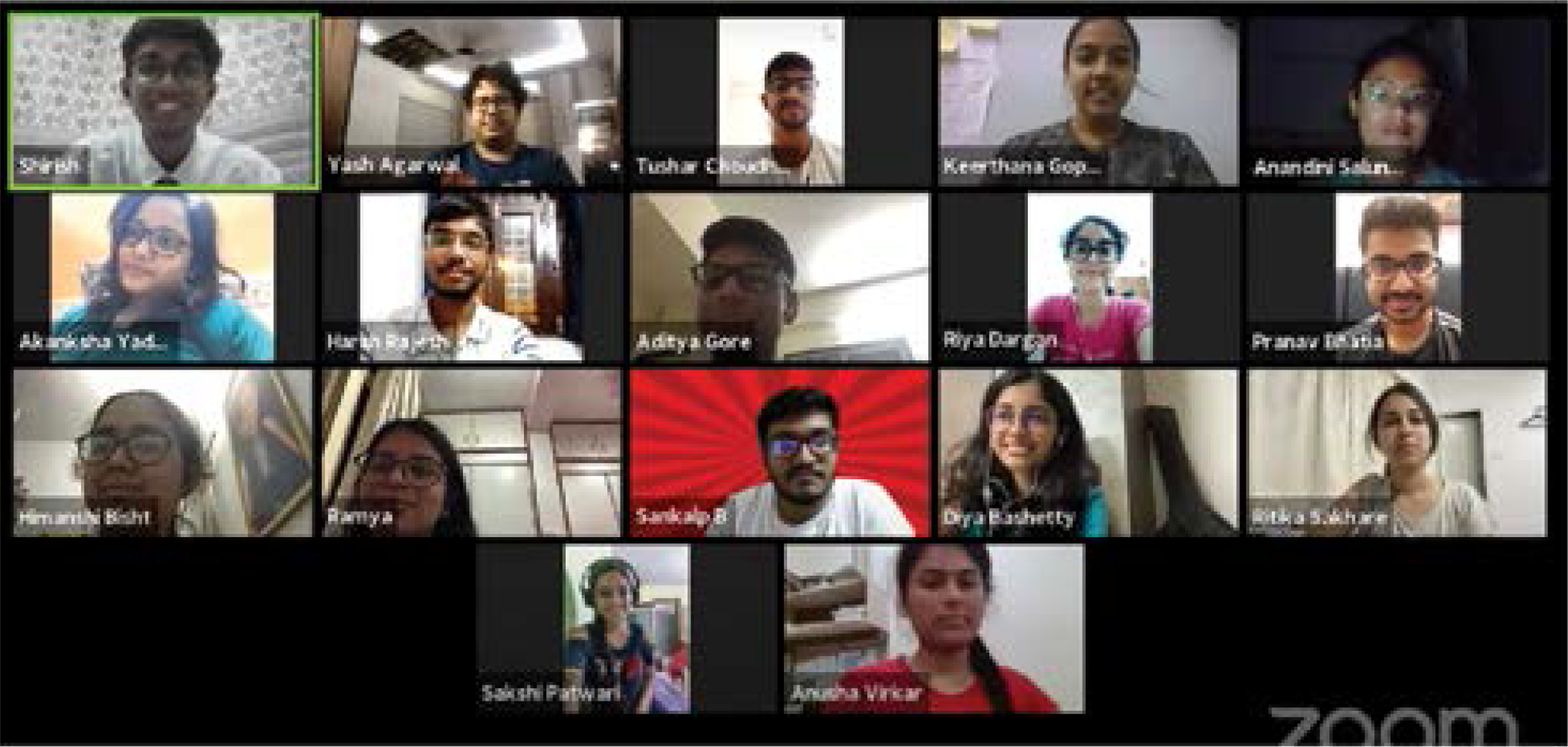
- Online peer-based teaching sessions (Research Ideation)
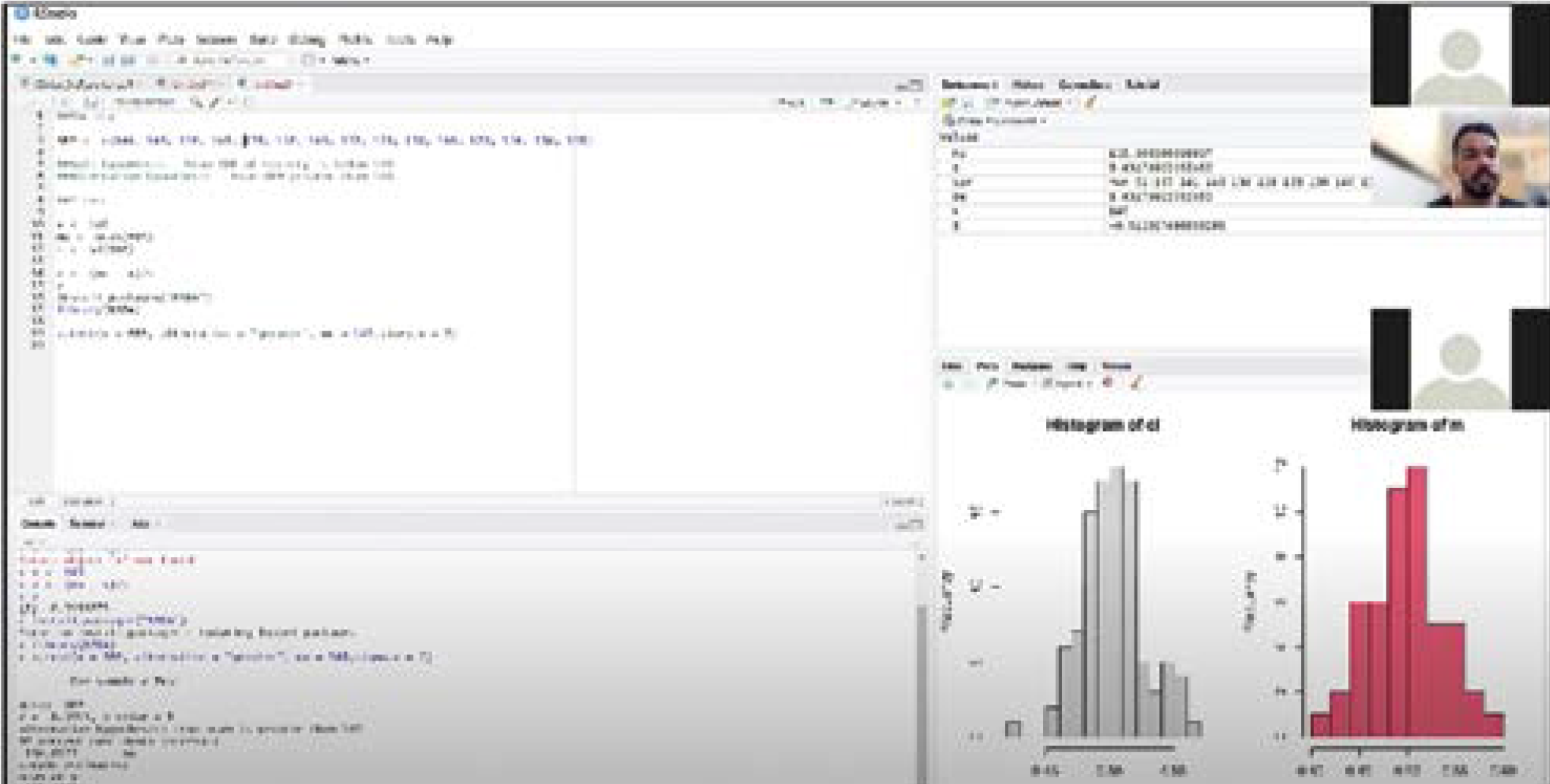
- Online peer-based teaching sessions (Practical Biostats)
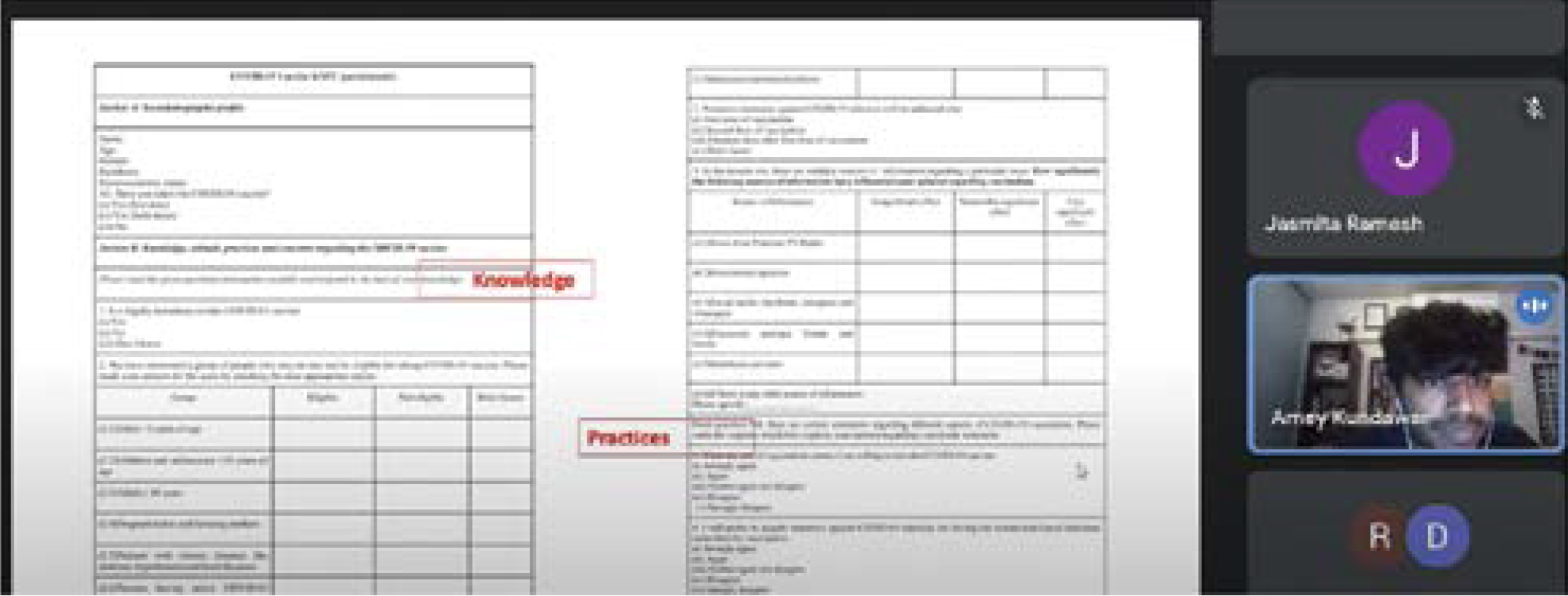
- Online peer-based teaching sessions (Questionnaire designing)
PROGRAM EXECUTION
The training program was conducted throughout October 2021 and 2 sessions were conducted each week. 124 students had registered for the program. Before the start of the program a pre-test questionnaire to assess the baseline knowledge of the students was administered. Each session was moderated by one of the organizers who handled the online meeting and also facilitated discussion between the peer mentor and the students.
The first session was taken on Research Ideation in which the peer mentor explained how students can narrow down their research ideas into a specific research question and define the objective of their research. The session taught students how they could take inspiration from clinical wards, community, professors and even their own peers. The focus of the session was on making students understand how to find a research gap while refining their ideas based on Feasibility, Innovation, Novelty, Ethics & Relevance (FINER). Students were made to actively participate by asking them to come up with crude ideas at the start of the session, which they themselves refined into research questions and objectives using PICOT and SMART criteria by the end of the session. In the same week students were introduced to practical concepts of effective Literature Search. In this session students were first asked to do a literature search based on their existing knowledge of the research questions they developed during the last session. Following this, the peer mentor introduced the students to various platforms for searching literature and made them realize how a vast number of papers could be missed if the right strategy was not adopted. The mentor demonstrated literature search on PubMed, with special focus on use of tags, Mesh terms & Boolean operators in various combinations. This was followed by a hands-on literature search by the students for their own topics, under the mentor’s guidance.
The subsequent session was taken on choosing the best Study Design. Students were introduced to all kinds of designs but were made to work mainly on observation designs as they are more feasible and easier to start with for undergraduates. Their research ideas were actively discussed and were used as examples to explain each of the study designs. Following this session, students were taught Practical aspects of Biostatics. Since biostatistics are closely associated with the study design used and have great implication in designing questionnaires and study protocols, this session was placed early. Students were taught types of data, central tendencies and tests of association and correlations. Application of various statistical tests was taught using the “Which test Where” matrix, which helped the students match the tests with appropriate data type, study design and objective. They were also taught how to execute these tests hands-on using the JASP software.
Once the students grasped basic concepts from the above sessions, they were taught how to design a questionnaire, write a study protocol and seek ethical clearance. The session on questionnaire designing started with mythbusters. Students were explained how a simple google form, which isn’t scientifically structured and validated, would be of no value in research. They were taught how to develop a questionnaire from scratch using literature, open-ended participant surveys, group discussions and consultation with subject experts. They were taught practical aspects of how to do content validation & find reliability of the questionnaire. Mentors also mentioned how they could use pre-validated questionnaires and scales that are already available online. In the protocol writing session, the mentor first explained how protocol acts as a blue-print for research and showed multiple examples of protocols or various study designs to the students. Then the students were asked to fill in the content in protocol templates according to their research ideas. The mentor specifically focused on sample size determination, sampling and data collection strategies & writing outcomes and implications of the study. The Ethics approval session was taught using live demonstration of protocol submission using the institutional ethics committee website. All the document requirements along with their templates were provided to the students. They were also taught the concept of various types of consents and special permissions required for vulnerable groups.
Lastly two sessions were taken on how to write different types of Manuscripts and publish them. The first session focused on writing short manuscripts like case-reports, short reviews and commentaries. The mentor explained which types of cases and topics were suitable to write such manuscripts and taught reporting guidelines like CARE. Students were also taught the importance of networking & collaborations while writing such manuscripts. To conclude, a session on writing original articles using reporting guidelines as suggested by EQUATOR network was conducted. Students were given tips about summarizing their results, making tables, figures and handwriting discussion of the manuscript. They were also taught to choose suitable journals for publications, using the concept of scope, indexing and impact factor.
All the sessions mainly focused on practical aspects of each topic and hence exhaustive reading material was also provided to the students to understand in-higher concepts and theories. Recordings of all the sessions were also made available. At the end of the program, a post-test questionnaire to assess the change in knowledge and a retro-pre likert questionnaire to assess the change in their perceived skills was administered.
IMPACT & LESSONS LEARNT
There was a significant increase in knowledge (N=86, 11.05±3.40 v/s 16.12±6.154, p<0.001) and perceived skill (N=86, 20.30±18.10 v/s 53.65±21.63, p<0.001) scores of the students (Figure 3A & B). Skill scores had a significant positive correlation with posttest knowledge scores (r = 0.305, p<0.001). This suggests that our interventions significantly improved the knowledge and skills of students, and the increase in perceived skills was due to the increase in knowledge of the students. The feedback provided by students was highly positive and encouraging (Panel). We learnt that, while teaching research to medical students, it’s more important to focus on practical aspects by means of live demonstrations and hands-on sessions. Peer-based teaching encourages more active participation from the students and they are less hesitant to raise their doubts. Our experience suggests that online peer-based research training programs can be highly effective in enhancing knowledge and skill of students and thus empower them to conduct good quality research
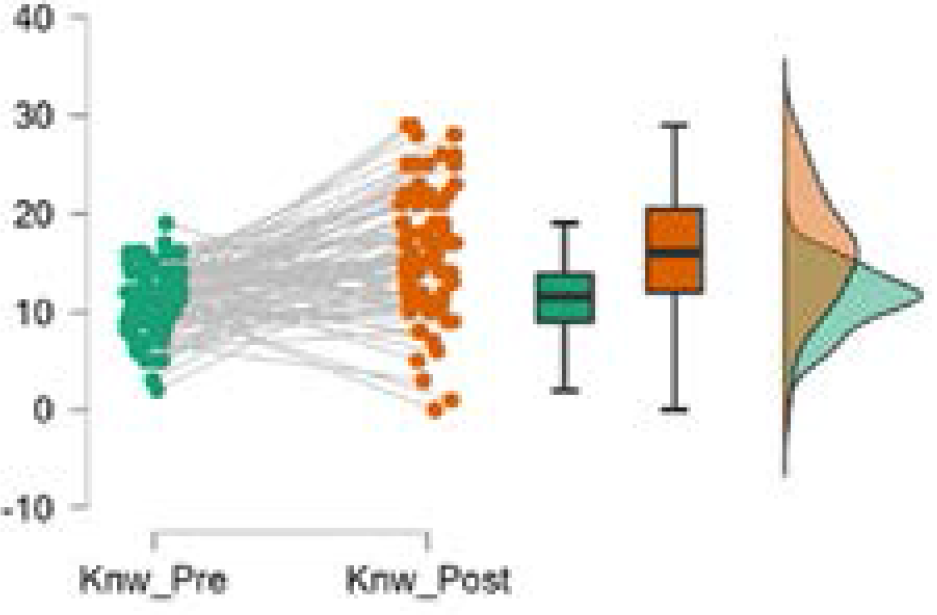
- Change in Knowledge of the students due to Quaesitio
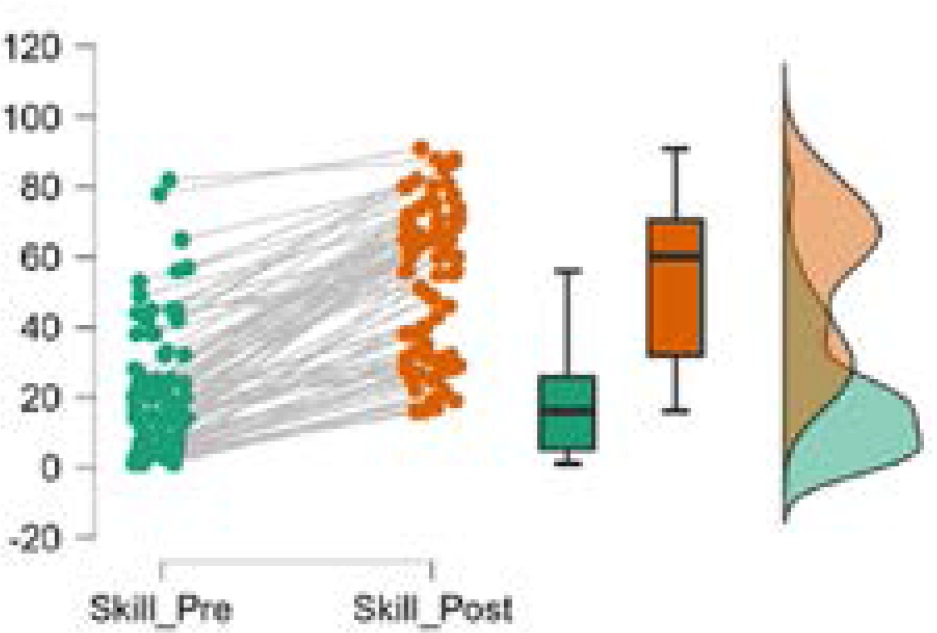
- Change in perceived skills of the students due to Quaesitio
END NOTE
Author Information
Shirish Rao, Clinicase Essen, India; Rajarajeswari Medical College and Hospital, Bengaluru, India Fouziya Shaikh, Clinicase Essen, India; Krishna Institute of Medical Sciences, Karad, India Ritika S Sakhare, Clinicase Essen, India; Rajarajeswari Medical College and Hospital, Bengaluru, India
Conflicting Interests
None declared
Panel: Feedback provided by students
“Being a Peer group discussion made it so easy to connect and understand the concept of research.”
“The session felt like a conversation with a fellow senior, helped a lot to gain knowledge from a senior in the field”
“They really take good efforts to elaborate basic ideas to be clear for beginners”
“The fact that the speaker actually cared whether the information was getting through to the audience at times and avoided a monotonous tone.”
“The mentor explained everything really well. Plus he was super chilled and answered all queries clearly, and thereby added a proper sense of understanding to the session, something which usually lacks in online sessions. The session was quite interactive and therefore remained interesting”
“I loved how it was right to the point and that we were showed how to go about it rather than just tell us in a ppt”
“Briefing and hands on experience by demonstration were the best parts”
References
- Lack of research amongst undergraduate medical students in India: It’s time to act and act now. Indian Pediatr [Internet]. 2017;54(5):357-60. [cited 2023 May 24]; Available from
- [CrossRef] [PubMed] [Google Scholar]
- Knowledge, attitude, practice, and barriers toward research among medical students: A cross-sectional questionnaire-based survey. Perspect Clin Res [Internet]. 2019;10(2):73-8. [cited 2023 May 24] Available from: https://www.ncbi.nlm.nih.gov/pmc/articles/PMC6463502/
- [CrossRef] [PubMed] [Google Scholar]
- Peer assisted learning: a new teaching approach in undergraduate medical students JCDR [Internet] 2021. [cited 2023 May 24]; Available from: https://jcdr.net/article_fulltext.asp?issn=0973-709x&year=2021&volume=15&issue=7&page=JC01&issn=0973-709x&id=15081
- [Google Scholar]
- AS P.I.R.E: A student led initiative to foster a facilitative environment for undergraduate medical research. Perspectives in Clinical Research [Internet] . 2022;13(2):65. [cited 2023 May 24]; Available from: https://journals.lww.com/picp/Fulltext/2022/13020/A_S_P_I_R_E__A_student_led_initiative_to_foster_a.2.aspx
- [CrossRef] [PubMed] [Google Scholar]






